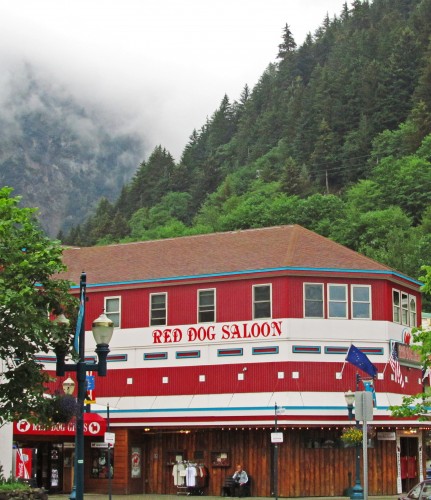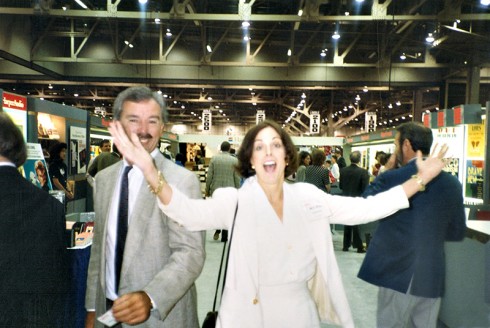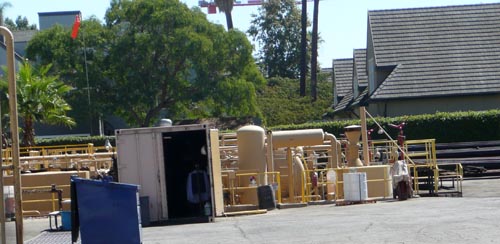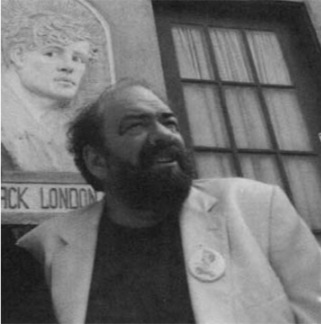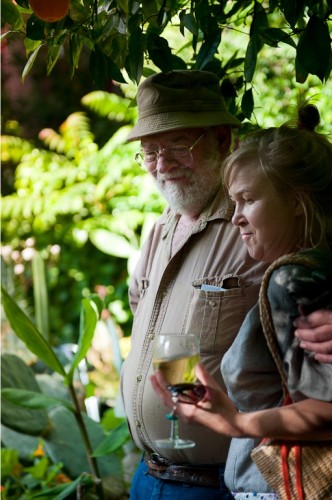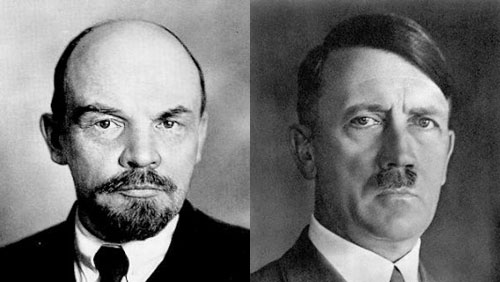A VETERAN BOOKMAN’S ROAD TRIP CONFESSIONS
Red Dog Saloon, Juneau, Alaska
By Bob Vickrey
When I walked through the swinging doors of the Red Dog Saloon, everyone in the dimly lit bar seemed to stop what they were doing to check out the stranger who had entered their private domain.
I found an unoccupied seat at the crowded bar and ordered a Kodiak Ale on tap. The bartender studied me before asking where I was from. Back then, the citizens of Juneau could easily recognize a stranger in town. This was in an era when Juneau was still a relatively isolated place, and long before the Princess Cruise ship invasion brought thousands of international tourists to its shores. Read more
Gaza without Cement!! For How Long Will This Last?
By Mohammad Arafat
Our Gaza Correspondent
While walking west through the streets and lanes of Gaza to my university I noted something that was out of the usual. I noted that many of the homes were only partially constructed. Stanchions were there supporting the unfinished ceilings because there was no cement to finish them.
Gaza has become a place without cement. You don’t stop to notice such things until you realize something important is missing. At the entrance of one building, there was a guard I know named Abu-Osama. He had made a chair to sit on from two stones. He was boiling unsweetened coffee in a small kettle.
“Hello Abu-Osama,” I said.
“Hello Mr. Mohammad, you are so welcome,” he said. I took a seat, also made of two stones, beside him. Read more
The Future Governor From Newhall, California
By LIONEL ROLFE
The obituary notice of a four-term California assemblyman who died at 86 the other day brought back memories of an odd and jarring time in my youth when he hired me to write a philosophy because he was then an aspiring politician.
When I first met Jim Keysor in the late ‘60s, I was a reporter at the Newhall Signal. On hot summer days, the president of the Newhall Chamber of Commerce would stroll across the patio to gab with us in our modest cityroom.
Jim Keysor was the chamber’s president, but he struck me a little different than the usual kind who becomes president of the chamber of commerce. This isn’t to say he was a fellow member of the counter culture. He wasn’t. He was a Mormon, from a prominent Mormon family, and he was a Democrat of sorts. Read more
TALKING UNION
BY LIONEL ROLFE
There’s a curious thing about talking union. It’s not cool. Unions ain’t cool. They’re so not cool you’ll notice almost nobody writes about them. They ain’t trendy. But they’re the coming thing.
True, most of the great folk songs about workers organizing are from yesteryear. But ignoring something doesn’t mean it’s not there. There are no doubt more songs yet to be written.
For many years, Harry Bernstein was the Los Angeles Times’ labor reporter, and while his politics were distinctly middle of the road, he knew his subject. During the glory years of the Times, he provided generally fair and knowledgable coverage of labor, which was amazing considering that the newspaper had been known as the most anti-labor rag in the world.
Bernstein was a good antidote to the newspaper’s history, and it also strongly suggested the owners really were trying to build up the old paper into something great and important.
Now Bernstein is gone, and the Times apparently has no one left who can or would be allowed to write intelligently about labor. Despite what you might think, Hollywood is not the only economic driver of Los Angeles. The Los Angeles area is one of the world’s greatest industrial areas, comparable to the Ruhr in Germany or the vast industrial areas of Shanghai. There’s a lot of organizing in the city these days. Some even dream of organizing Walmart and McDonald. Read more
WRITING CAREER COMES FULL CIRCLE AFTER FOUR DECADE DETOUR
With Editor Nan Talese at Book Expo in 1992
BY BOB VICKREY
When my former college journalism professor spotted one of my columns in the Houston Chronicle a few years ago, he sent me a note that simply read, “What took you so long?”
The question he posed in that message has been asked by others in recent years after I had spent the majority of my working life as a publisher’s representative for a well known East Coast publishing house before my retirement in 2008. I had entertained early plans to build a career as a newspaper reporter and columnist after college, but somewhere along the way I became sidetracked and landed a job in the book publishing business more than four decades ago.
After spending many years promoting other writers and their books, I have since become sympathetic with their plight as I attempt to regain firm footing and lose some of the rust accumulated during my long absence from writing. I began sending out my stories to newspaper editors in recent years and was pleasantly surprised to find several of them found space on their pages for my feature pieces. There was an uncomfortable, but somewhat exhilarating feeling of producing my own work after a career spent critically reading other writers’ efforts. Suddenly, I found the shoe was on the other foot, and now have discovered a greater appreciation of the writer’s quandary in walking the creative tightrope without assurance of a “safety net” to catch us when we are in free-fall. Read more
West Adams Oil Blues
Leslie Evans, in consultation with Michael Salman
My neighborhood is the West Adams section of Los Angeles, just south and west of Downtown. Its miles of historic, century-old Craftsman homes, interspersed with sixties-vintage apartments, house a mixture of recent Latino immigrants, older African Americans, and a minority of whites and Asians. We’ve been in the newspapers a lot recently in disputes with two oil companies over three of their urban drill sites. At one of them, run by the Allenco Energy company, children have been getting sick. Nosebleeds, respiratory problems, headaches, and nausea have been chronic, leading finally to protest meetings, one attended by some two hundred residents, intervention by the federal Environmental Protection Agency and the County Health Department, and a lawsuit by the Los Angeles City Attorney.
At the other two sites, owned by Freeport-McMoRan Oil and Gas, concerns began over ill-kept property, or fears that plans for new drilling would generate noise and pollution. As news reports of the health problems at Allenco spread, neighbors near the Freeport sites heard about a gas leak at one of the well sites and a few accounts of people who may have been sickened by fumes in the past. One public meeting drew more than 300 residents. City officials responded by temporarily closing the Allenco site entirely, while at the Freeport sites routine pumping continues but scheduled new drilling has been put on hold.
What’s Wrong With Today’s Journalism?
Lionel in front of a bas relief of Jack London, in earlier times when journalism was a hell of a lot better. Photo copyright Phil Stern.
By LIONEL ROLFE
Now that the Los Angeles Times is being orphaned by its corporate overlords, it caused me to think long and hard about this terrible business I’ve been in now for upwards of 50 years.
First there was the personal shock. On many occasions back in the good old days, I used to prowl the long hallways of the Times’ building because I was doing a lot of writing there. And even today I enter into the hallowed halls of the giant building on First and Spring streets and all around me I see the devastation of a war against the newspaper. Its amazing how the same hallways feel so different in different eras. Things have been on a downward spiral ever since the Chandler family sold the paper to the Chicago in 2000.
Back in the ’60s, the cityroom reeked with a sense of confidence. True, even back then oldtimers were uncomfortable because publisher Otis Chandler had allowed his mother “Buffy” to remodel the city room so it looked like an insurance company’s executive offices. No longer could you throw your cigarette butts on the ground and grind them into the floor with your soles and heels. The carpeting was corporate luxurious, and ashtrays and private places to hide your hooch were conspicuous by their absence. Read more
PENELOPE SUDROW: a wandering waif with a hint of noblesse oblige
PENELOPE MEETS LIONEL AT A PARTY IN SILVER LAKE
BY LIONEL ROLFE
I met Penelope Sudrow at a backyard party in the Silver Lake home of my actor friend Lee Boek, who runs Public Works Improvisational Theater. It wasn’t just because she was an attractive woman that made me curious about her. I sensed that she was somebody more than just a pretty lady.
What was intriguing was that sense that she was a woman-child. Although she looked like a woman, she had something of the vulnerability of a child about her as well a sense of fun and wonder you rarely see in a normal grownup. I was not surprised when I found out she had been a well known child star. Read more
Once Again, Gaza Is A Big Cage & Our Gaza Correspondent Has Witnessed A Lot Of It
[This month we have another contribution by our Gaza correspondent, Mohammad Arafat. He expresses with deep feeling the suffering of the ordinary people of Gaza. We should say also that he has a certain innocence in his view of the world. He sees plainly the pain inflicted by the border restrictions by Israel and Egypt, but never mentions Hamas, which governs Gaza, or Islamic Jihad, or the recent terrorist attacks in the Sinai that precipitated Egypt’s closing of the Gaza tunnels. These things explain much of why conditions in Gaza are far worse than those in the occupied West Bank, which has its own burdens but not of such extremity.]
* * *
By Mohammad Arafat
I wish I could sum it up quickly,what does it all mean. Maybe I should contemplate why it’s so hard to say what’s most on my mind. I’m not even sure who I’m talking to–perhaps to my critics, my supporters. But Gazans have been told for too long they had no right to write. Maybe this is why I don’t know why I’m writing and to whom.
But I know that I have a right to express what’s going through my mind. At first, my pen refused to write and then I began to cry and moan. But then I wiped away my tears and realized nothing could stop me from writing. I had come to believe that people won’t read anything written about Gaza these days. I told myself that it’s true, a great many people in this world can support us, and read what we say, but victory won’t come from those people, even if they stand with us. Still, I must try simply because I I must serve truth.
Leninism and Nazism: Opposites, Twins, or Siblings?
Leslie Evans
The Devil in History: Communism, Fascism, and Some Lessons of the Twentieth Century. Vladimir Tismaneanu. Berkeley: University of California Press, 2012. 320 pp.
Vladimir Tismaneanu is a Romanian who grew up under the Stalinist dictatorship that ruled his country from 1947 to 1989. Born in 1951, he was almost forty when Ceausescu was overthrown. His father was an important propagandist for the Communist government. Vladimir headed the 2006 Presidential Commission for the Study of the Communist Dictatorship in Romania, which condemned the Communist period as a criminal regime. The report was highly controversial, denounced by high ranking former communists who were condemned by name, by liberals who pointed to Tismaneanu’s past as a convinced Marxist-Leninist, and by the far right because Tismaneanu is a Jew. He teaches currently in the United States at the University of Maryland.
In The Devil in History Tismaneanu spends almost no time on the fascist devil. Where he does reference them it is in sociological generalities about Hitler Germany, where the crimes of the Nazis are so well known they require no elaboration. He deals with them mostly by occasional paragraphs in which he establishes specific similarities and differences from their leftist enemy.

